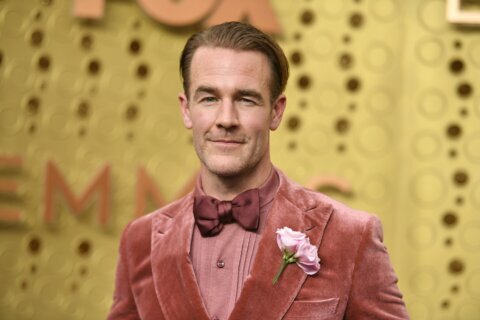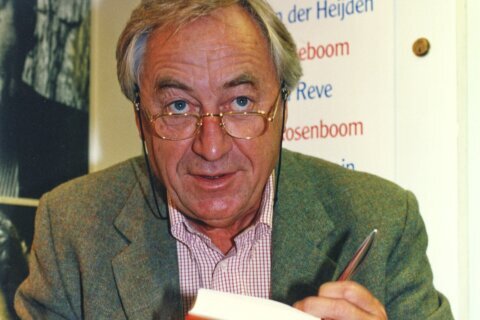WASHINGTON — Few TV shows push the late-night envelope like “American Horror Story.”
The FX original series produced by “Glee” co-creators Ryan Murphy and Brad Falchuk is an anthology similar to HBO’s “True Detective” in that each season tells a self-contained story. But in case you’ve been living under a TV rock, the key difference is that “AHS” largely uses the same principal cast members each time, recasting the stars in different roles under a new horror theme.
Season 1, retroactively titled “Murder House,” told of a murderous mansion and won an Emmy and Golden Globe for Jessica Lange; Season 2 “Asylum” explored a mental institution and won an Emmy for James Cromwell; Season 3 “Coven” dabbled in witchcraft and won Emmys for both Lange and Kathy Bates; and Season 4 “Freak Show” saluted carnies to win Emmys in five technical categories.
Now, the fifth season “Hotel” takes us into a supernatural Los Angeles haunt — the Hotel Cortez — introducing Lady Gaga as a sex-crazed Countess who slashes victims with her razor-sharp glove in order to taste their blood. It also features plenty of familiar faces: Kathy Bates mans the front desk; Wes Bentley plays a grieving detective; Sarah Paulson plays a drug addict; Angela Bassett plays a love-scorned film star; and Evan Peters plays the sadistic butler who founded the hotel in the 1920s.
https://www.youtube.com/watch?v=6l_HeQyKEOU
Loosely based on real-life serial killer H.H. Holmes, who custom-built a Chicago hotel for murder in the 1890s, the fascinating premise carries plenty of potential, but it all depends on the execution. Unfortunately in this case, the sex and violence are so over-the-top that it feels less like an erotic thriller — a la “Blue Velvet” (1986) or”Fatal Attraction” (1987) — and more like a straight snuff film.
While puritanical viewers may oppose this approach for moral reasons, my opposition is purely cinematic in that it’s a lazy approach that cheapens the genre to the lowest common denominator.
Granted, hard-core fans may echo the FaceTime remark of Bentley’s daughter: “It was gross and awesome at the same time!” The “Hotel” premiere brought FX’s second-highest ratings ever, behind last year’s premiere, before ticking down from 5.8 in Episode 1 to 4.0 in Episode 2 to 3.2 in Episode 3.
People are most definitely watching. But is it a reaction to quality, or is it the habit of brand loyalty? Why cancel our routine Wednesday “AHS” parties? It’s still a fine mindless diversion to invite a group of horror fanatics over for popcorn, red wine and a few jump scares that will surely stain your carpet. And yet, subconsciously, we viewers are not only becoming desensitized to the graphic sights and sounds, we’re losing our ability to watch with patience because we’re being force-fed schlock.
As a result, both critic and public reaction has plummeted from the series’ heights. Rotten Tomatoes saw critics slowly warm up to the series with 64 percent for “Murder House” and 77 percent for “Asylum,” before leaping to 81 percent for “Coven” and 87 percent for “Freak Show.” Public voters had an opposite trajectory, going gangbusters to start with 80 percent for “Murder House” and 88 percent for “Asylum” before dipping to 73 percent for “Coven” and 66 percent for “Freak Show.”
Both trends lead us to the same place for “Hotel,” as the critics have sunk to their lowest rating at 55 percent, while the public has sunk to its lowest rating at 62 percent. If there’s a consensus between both groups, it’s that this season of “American Horror Story” is its weakest yet in terms of quality.
That’s not to say the filmmakers aren’t doing some nice things. We must give credit where credit is due. The opening crane shot from the hotel sign to a high-angle indicates the doom hanging over the Swedish tourists. The fish-eye lenses and dutch-angle tilts keep us on necessary edge. The spinning camera around Bentley brilliantly reflects the panic he feels after his son’s abduction on a carousel. And when a major character slits his throat, you can bet the blood splatter covers the camera lens.
More broadly, the production values are top notch from the lavish set design to the mood lighting to the symbolic soundtrack of “Tear You Apart” by She Wants Revenge and “Hotel California” by The Eagles, who remind us that “we can check out any time we like but we can never leave.” While a somewhat obvious song choice, this “Hotel California” montage is actually one of the more engrossing bits of Season 5. Why? Because of the patience of longer takes, slower camera moves and cuts carefully timed with song lyrics: “There she stood in the doorway” hits as Bentley exits a door.
These are the sorts of things that make us active viewers, inviting us to engage with the material. Unfortunately, much of “Hotel” relies on passive viewers bombarded by shockers. You don’t have to think when you’re being sprayed by blood. All you have to do is duck. So while we keep checking in to the “Hotel” for these basic primal thrills, our minds are gradually being conditioned to check out.
Perhaps the writers hope the bodily fluids will distract us from noticing the blatant rip-offs from horror past. Some of these references feel like loving allusions, while others feel like sad copycats.
Loving Allusions:
- The setting of the L.A. hotel recalls the famous “Alfred Hitchcock Presents” episode “Man from the South” (1960) where Steve McQueen takes a dangerous hotel bet with Peter Lorre.
- The flickering credits recall the Bates Motel in “Psycho” (1960) — only now it’s Kathy Bates.
- Gaga’s introduction during an outdoor movie screening of F.W. Murnau’s silent “Nosferatu” (1922) comes with a rack focus from Gaga to Max Schreck. Film buffs will geek out even further knowing that Murnau also directed “The Last Laugh” (1924), all about a hotel doorman.
Sad Copycats:
- The geometric carpet patterns, forbidden rooms and creepy children standing at the end of hallways remind us exactly of “The Shining” (1980).
- The detective’s trail of Ten Commandment killings is an absolute copy of “Se7en” (1995), where the serial killer memorably punishes his victims for committing the Seven Deadly Sins.
- And most obvious, the disguised killer’s voice during phone calls sounds just like “Saw” (2004).
Call these respectful homages if you want, but references to “The Shining” and “Se7en” are only respectful if you do them justice. “Hotel” misunderstands what made those flicks creepy in the first place, forgetting that “The Shining” worked because of the slow-burn build of Jack’s madness, and that “Se7en” sold its “what’s in the box” shock with the notion that what is unseen is always scarier.
“Hotel” would have had Jack Nicholson hack his family with an ax in the opening scene, before ending the episode with Kevin Spacey showing the gory contents of what’s in the box. Less is more! Merely referencing these masterpieces in image — but not in spirit — does those great films a disservice. The more relentless the schlock, the more likely that younger generations will begin to find “The Shining” too slow, “Psycho” too boring or “Se7en” not gory enough. What a shame. Let’s stop the bleeding.
“American Horror Story” is blazing the current path of mainstream horror, thus holding the genre back from the suspenseful heights it could reach with just a little more restraint. Give us more meat to the story, so that by the time we expose the bone, we care about the victims with the emotional investment we gave “The Sixth Sense” (1999) ghosts or the “Let the Right One In” (2008) vampires.
Will the real suspense filmmakers please stand up?
As Gaga advises her heartbroken beau: “You will learn, it isn’t our precious virus that makes you, it isn’t who you kill or who you screw, it’s the heartbreaks. The bigger, the better.”
The suggestion is that we can learn from getting burned.
So with that, I constructively say: “American Horror Story,” you broke my heart.








